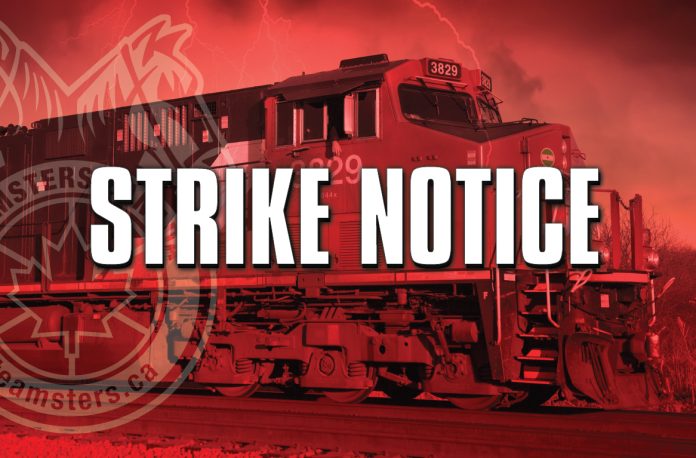
Canada’s main two rail lines, Canada Pacific Kansas City (CPKC) and CN Rail, could be shut down next week. As management attempts to gut 9,000 Teamster members’ safety protections and extend their hours, the union and the company are set for a collision—either in the form of a strike or a lockout.
Overwhelming mandate to strike
On Aug. 14, thousands of train conductors, engineers, yard workers and rail traffic controllers represented by the Teamsters Canada Rail Conference (TCRC) voted overwhelmingly to strike—for a third time this year.
For years, both companies have combined ruthless job cuts with never-ending speed-ups to squeeze more out of their remaining crews. It is well-known that the working conditions on Canada’s rail lines are already deadly, owing to these cuts. In fact, the man who pioneered CN Rail’s so-called Precision Railroading system, former CEO Hunter Harrison, admitted it himself, once telling legislators: “I got blood all over my hands…from injuries in this industry that should have been avoidable.”
According to the union, management demanded even deeper cuts during this round of talks.
Specifically, they sought to extend the workers’ hours, scrap what’s left of their fatigue protections, and force workers to leave their families to cover staff shortages across the country.
After months of talks and state-mandated arbitration, the bosses continue to demand concessions, forcing the workers to strike.
“From the very beginning, rail workers have only ever sought a fair and equitable agreement. Unfortunately, both rail companies are demanding concessions that could tear families apart or jeopardize rail safety,” said union leader Paul Boucher.
Adding insult to injury, both companies have responded to the strike vote with a threat to lock the workers out by Aug. 22—unless the workers accustom themselves to the “status quo” plus so-called “service flexibilities.” That means, in plain language, unless the workers accept more overwork, more injuries and more precarious lives in general.
‘Literally nothing would move’
Already, the rail bosses have started halting shipments of sensitive goods like meat, chlorine and medicine. Train stations all over Canada and in key U.S. cities like Chicago, Minneapolis and Memphis are also bracing for impact.
Predictably, Canada’s capitalist press is seizing the opportunity to blame the workers.
As CBC News summarized: “Shippers and producers say a work stoppage would snarl the country’s supply chains, halting freight traffic and disrupting industries.”
Canada’s business press is warning of an imminent “catastrophe” that could “shut down Canada.” “The magnitude of the disruption is daunting,” the Business Council of Canada said, while Pulse Canada warned “It’s a catastrophe. Literally nothing would move.”
It’s true that these workers are hugely important to Canadian capitalism, with each company moving hundreds of billions of dollars in goods every year. But this “catastrophe” is entirely management’s fault. They have spent years driving up workloads, increasing hours and cutting staff. They have forced the union to this point by demanding new cuts, or as the media likes to call them, “concessions.”
But this looming “catastrophe” is a reminder of the enormous power that working class people have. Bosses make fortunes off the backs of the workers; but when workers decide to, they can bring the entire country to a halt. And it is precisely this power which is the only thing that can reverse the cuts to staffing and safety.
No to back-to-work legislation, no to binding arbitration
Since the first strike vote, right-wing politicians and groups—including chambers of commerce, Alberta’s United Conservative Party government and at least one U.S. Republican senator—have called for the federal government to break the strike.
So far, however, the embattled Prime Minister has been mostly silent.
Aside from dragging the union and the company through months of fruitless binding talks, Trudeau’s cabinet appears hesitant to intervene.
Trudeau’s Labour Minister says it’s because “the government firmly believes in the collective bargaining process and trusts that mutually beneficial agreements are within reach at the bargaining table.”
But this is obviously a lie. From 2015 to 2022, the Trudeau government broke plenty of strikes, by postal workers and dock workers alike.
The Liberal government policy is not dictated by a friendliness to unions or because they defend the working class. The Liberals have consciously followed a calculated policy of class collaboration, in an attempt to blunt the sharp edges of the developing class struggle. While all of the capitalist parties know that they ultimately need to offload the burden of the crisis onto the backs of the workers, politicians are anxious about provoking a working class revolt as has been seen in countries all over Europe.
And the capitalist class had a bit of a scare in the fall of 2022 when back-to-work legislation against CUPE education workers in Ontario provoked a massive backlash. What began as a fairly small strike by Ontario’s worst-paid public sector workers soon spread into a near general strike involving every section of the working class. With Trudeau’s popularity plummeting and strikes trending upwards, his fear of labour unrest starting with a rail strike and spreading further is real.
But this impasse cannot last forever. The workers have now voted three times, by over 90 per cent, for an all-out shutdown. Their anger and their fighting spirit must be seized upon to win back what the workers have lost.
Binding arbitration, at this point, would serve no purpose. The companies have made it clear that they have no intention of budging. And the state-appointed arbitration system has never in the history of labour relations forced them to give in.
We must rely on our own strength.
Now that management has shown its willingness to lock all 9,300 workers out, to break their resolve, the union must respond in kind. The best way to fight their all-out lockout is with an all-out strike.
Victory to the rail workers!
Strike to win!

